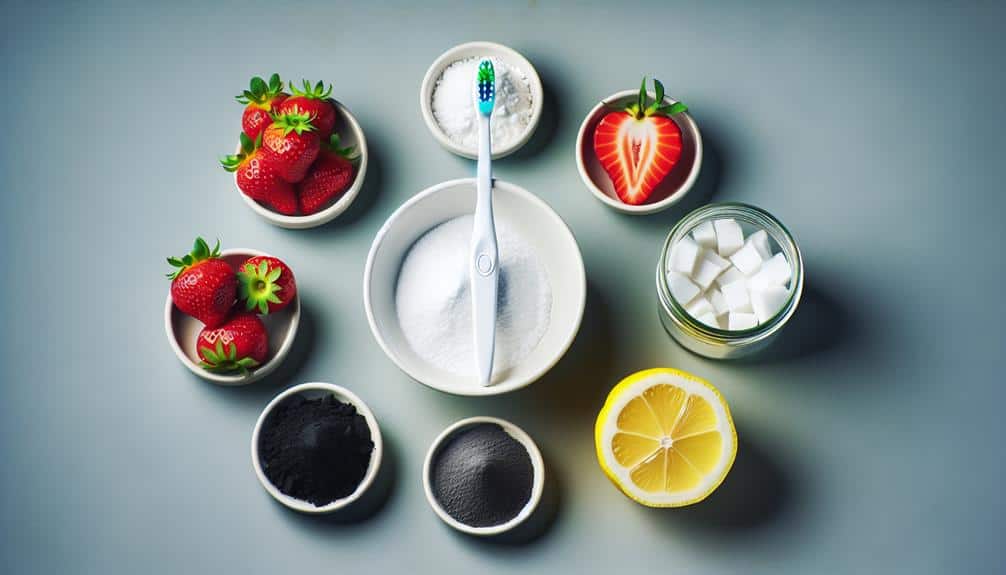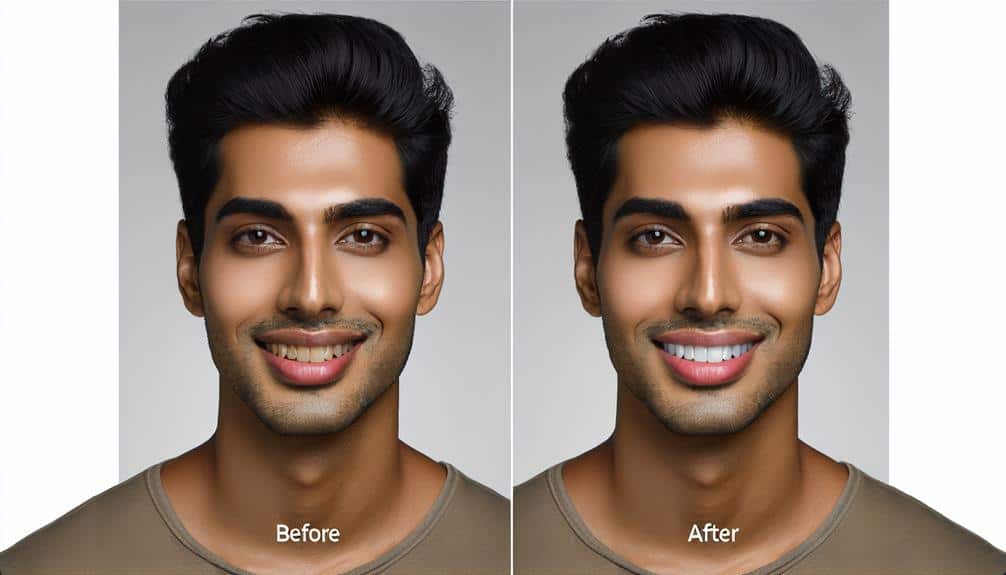To get rid of tobacco stains on your teeth, consider using baking soda for gentle scrubbing or try oil pulling with coconut oil to reduce bacteria causing stains. Diluted hydrogen peroxide is a natural whitening agent, and there are over-the-counter products designed for smokers. Look for those with the Seal of Acceptance from the American Dental Association. Laser treatments and customized whitening procedures from cosmetic dentistry can effectively target tobacco stains, providing noticeable results in just one session.
For long-lasting effects, avoid tobacco and dark beverages, maintain regular touch-up treatments, brush with whitening toothpaste, floss daily, and visit your dentist routinely. Expert guidance from a dental professional can help determine the best treatment for you.
Key Points
- Use professional whitening treatments for effective removal of tobacco stains.
- Incorporate natural remedies like baking soda and coconut oil for gentle scrubbing.
- Consider over-the-counter whitening products designed for smokers.
- Consult with a dental professional for customized whitening procedures.
- Maintain results with regular touch-up treatments and proper oral hygiene.
Importance of Teeth Whitening for Smokers
When it comes to teeth whitening for smokers, understanding the significance of maintaining a bright smile is essential for both oral health and overall confidence. Smoking not only affects your lungs but also leaves lasting marks on your teeth. Yellow or brown stains caused by nicotine and tar can impact your oral health by weakening enamel and leading to gum disease. Cosmetic dentistry offers solutions to combat these effects and restore your smile's brightness. Teeth whitening procedures can help remove tobacco stains, improving the appearance of your teeth and boosting your self-esteem.
Aside from the important benefits, teeth whitening for smokers plays a vital role in maintaining good oral health. Tar and nicotine build-up can be challenging to remove with regular brushing alone, making professional whitening treatments necessary. By addressing these stains, you can prevent further damage to your teeth and gums, promoting better overall oral hygiene. Prioritizing teeth whitening as a smoker isn't just about achieving a brighter smile but also about preserving your oral health for the long term.
Common Tobacco Stains on Teeth
To comprehend the impact of smoking on teeth whitening, it's important to acknowledge the common tobacco stains that can affect the appearance and health of your teeth. Tobacco stains are persistent and can vary in severity, from light yellowing to deep brown discoloration.
Here are some common tobacco stains on teeth:
- Essential Stains: These are caused by immediate contact with tobacco and can often be removed through regular brushing.
- Intrinsic Stains: These penetrate the enamel and are harder to remove, requiring professional intervention.
- Dark Brown Stains: Known for their intense discoloration, these stains may need specialized treatments for effective removal.
- Tar Build-Up: This sticky substance can accumulate on teeth, leading to significant discoloration over time.
- Nicotine Stains: Resulting from the nicotine present in tobacco, these stains can be challenging to remove without targeted interventions.
Understanding these common tobacco stains is vital for effective stain removal and discoloration prevention. By addressing these issues, you can better maintain the health and brightness of your smile.
Effective Whitening Products for Smokers
For smokers looking to enhance the whiteness of their teeth, exploring effective whitening products tailored to address tobacco stains is crucial. When it comes to combating tobacco stains, natural remedies and DIY treatments can be valuable options.
One effective natural remedy is baking soda, which can be mixed with a small amount of water to create a paste for gentle scrubbing. Another popular method is oil pulling with coconut oil, known for its antimicrobial properties that may help reduce bacteria contributing to stains. Additionally, hydrogen peroxide diluted with water can act as a natural whitening agent, but it's important to use it sparingly to avoid enamel damage.
For those preferring ready-made solutions, there are various over-the-counter whitening toothpaste and strips specifically designed for smokers. These products often contain ingredients like activated charcoal or baking soda to help lift stubborn stains effectively. When selecting a whitening product, look for those with the Seal of Acceptance from the American Dental Association to guarantee safety and effectiveness.
Professional Whitening Options for Smokers
Exploring professional whitening options tailored for smokers can provide more intensive and long-lasting results in combating tobacco stains on teeth. When contemplating professional whitening treatments, smokers have access to advanced techniques specifically designed to address the stubborn stains caused by tobacco use. Here are some alternatives to ponder:
- Laser Treatments: Laser-assisted whitening procedures can effectively target and break down tobacco stains on the teeth, providing a more precise and efficient whitening solution.
- Cosmetic Dentistry: Cosmetic dentists offer a range of treatments that can help smokers achieve a brighter smile, such as customized whitening procedures and veneers to cover severe discoloration.
These professional options often yield noticeable results after just one session, making them a popular choice for individuals looking to restore the natural brightness of their teeth. Consulting with a dental professional can help smokers determine the most suitable whitening treatment based on their specific needs and the extent of tobacco staining.
Maintenance Tips for Long-lasting Results
Maintaining the brightness of your teeth after professional whitening treatments tailored for smokers requires consistent oral care and adherence to recommended maintenance routines. To guarantee long-lasting results, consider implementing preventive measures such as avoiding tobacco products and dark-colored beverages that can cause stains. In addition, regular touch-up treatments can help prolong the effects of the whitening procedure.
Lifestyle changes play an important role in preserving your newly whitened smile. Brushing your teeth at least twice a day with a whitening toothpaste and flossing daily can prevent the buildup of stains. It's also vital to visit your dentist for regular check-ups and cleanings to address any potential issues early on.
Post whitening care is crucial for maintaining the results. Using a straw when drinking staining beverages can help minimize contact with your teeth. Moreover, being mindful of your diet and making conscious choices can contribute to the longevity of your whitened teeth. By following these recommendations and maintaining good oral hygiene practices, you can enjoy a bright, white smile for an extended period.
Frequently Asked Questions
Can Smoking Cessation Help Improve Teeth Whitening Results?
Giving up smoking can greatly enhance teeth whitening results. Nicotine replacement therapy helps in reducing tobacco stains, while enhanced oral hygiene after quitting improves the effectiveness of whitening treatments. Dedication to cessation supports a brighter smile.
Are There Any Natural Remedies That Can Help Remove Tobacco Stains From Teeth?
To remove tobacco stains from your teeth naturally, try DIY remedies like baking soda and lemon juice. Herbal solutions such as sage and mint can also help. These methods are as effective as a professional dental cleaning.
How Long Does It Typically Take to See Noticeable Results From At-Home Whitening Products for Smokers?
Typically, noticeable results from at-home whitening products for smokers can vary. Factors like product effectiveness, whitening timeline, and individual habits influence outcomes. Results may start showing in a few weeks with consistent use.
Are There Any Specific Foods or Drinks That Smokers Should Avoid to Maintain Whiter Teeth?
To maintain whiter teeth, avoid foods or drinks like coffee and red wine that can stain. Smoking exacerbates discoloration, so prioritize oral hygiene. Brush after consuming these items and consider using whitening toothpaste to combat tobacco stains.
Can Tobacco Stains on Teeth Be a Sign of More Serious Dental Health Issues?
Tobacco stains on your teeth might indicate underlying dental health issues. Your smoking habits can impact your oral hygiene markedly. Regular dental check-ups and proper oral care can help prevent these stains and improve your overall dental health.



